2022 Bucheon International Fantastic Film Festival Report
by Kyu Hyun Kim and Darcy Paquet
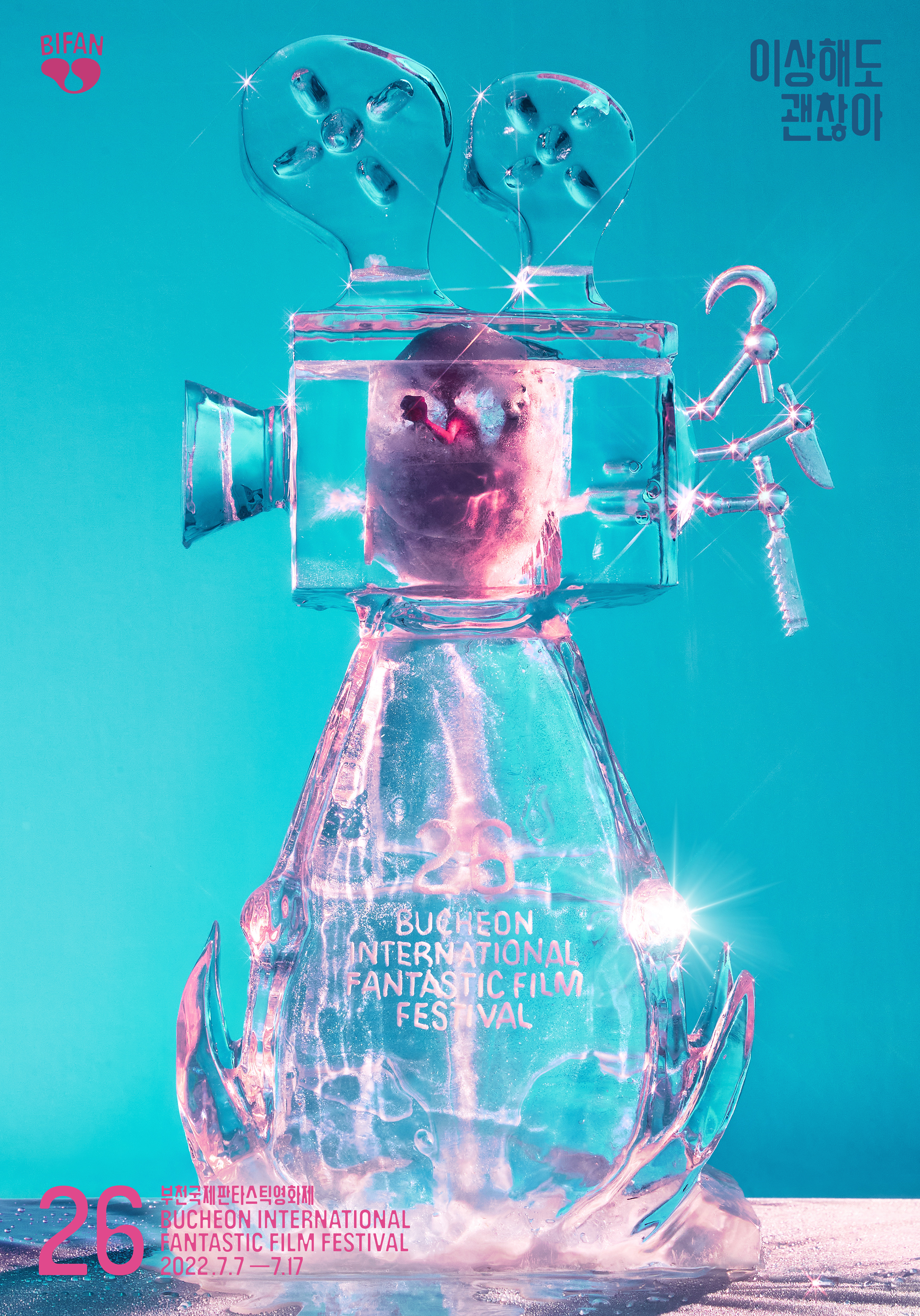
The pandemic years of 2020 and 2021 were tough for the Bucheon International Fantastic Film Festival (BiFan), for all the obvious reasons. Public health measures dictated that the 2020 edition be held without any in-person screenings, and although the 2021 edition did feature a number of films shown in theaters, international guests were absent, and most of the film viewing took place on the Wavve OTT platform, rather than in person.
To a significant degree, 2022 marks the return of the old BiFan -- although in some respects the festival has permanently changed. A total of 268 films from 49 countries will be screened during the event, which lasts from July 7-17. Many directors, actors and industry people from around the world will be making the trip to Bucheon to take part. The usual competition sections will be back: Bucheon Choice, in which 10 international features and numerous shorts will unspool, and Korean Fantastic, in which viewers can discover 10 new Korean features. A special section will be devoted to Seol Kyung-gu, with screenings of 7 of the actor's iconic works (including Peppermint Candy, Silmido, The Merciless and The Book of Fish). At the same time, BiFan will continue to provide online screenings through Wavve for those in Korea who can't make it to Bucheon. A total of 138 films will be available in this manner, both on- and offline. Meanwhile, the ambitious industry gathering B.I.G. consisting of the genre project market NAFF, the BiFan Fantastic Film School, and many other events will take place in person from July 9-12.
For us at Koreanfilm.org, BiFan 2022 also represents a renewal of sorts, with Kyu Hyun and Darcy both attending in person for the first time in several years. Reviews, impressions and other posts will be uploaded here as they are written. We hope that you enjoy this 2022 BiFan Report.
FILM REVIEW: THUNDERBIRD (Darcy)
Everyone seems to owe money to someone else in the small town of Jeongseon in the mountains of Gangwon Province, not far from Gangneung. Perhaps this is because the town's only attraction of note is a large casino.
As the film opens, Tae-min is splayed in the back seat of his car, drugged and barely conscious, as two debt collectors he doesn't recognize drive him across town. They take the car to a pawn shop, exchange it for some cash, and leave Tae-min on the sofa, the receipt in his pocket. When he wakes up he no longer owns his car, and he's not even sure which debt he just paid off.
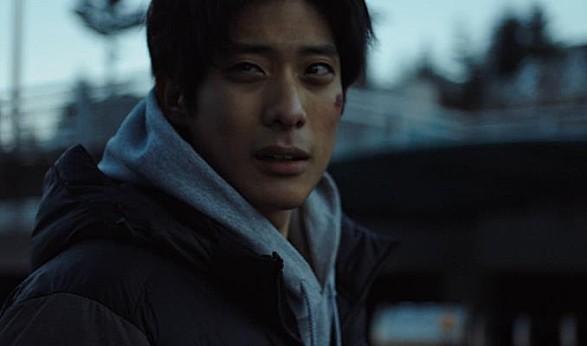 It's a nice car, an Audi A4 with a Thunderbird sticker on the windshield. But there's more: only Tae-min knows that inside the trunk of the car is 50 million won (about $45,000) in cash, which he recently won at the casino. He walks to the parking garage where he suspects the car is being stored, but before he can enter, he gets beaten up by another pair of debt collectors. In the end, his only option is to raise enough cash to buy back the car, and then to use the money in the trunk to pay everyone back.
It's a nice car, an Audi A4 with a Thunderbird sticker on the windshield. But there's more: only Tae-min knows that inside the trunk of the car is 50 million won (about $45,000) in cash, which he recently won at the casino. He walks to the parking garage where he suspects the car is being stored, but before he can enter, he gets beaten up by another pair of debt collectors. In the end, his only option is to raise enough cash to buy back the car, and then to use the money in the trunk to pay everyone back.
It's at this point that he calls his older brother Tae-gyun. Tae-gyun works as a taxi driver, but dreams of escaping Jeongseon and moving to Seoul, the city where he got his degree. He too is tied down by money troubles, however. When he hears about his brother's predicament, and about the cash in the trunk, he agrees to help, hoping he might get back some of the money his brother owes him.
Thunderbird takes place over a long winter night in which many things do not go according to plan. Tae-gyun and Tae-min are opposites in many ways, with Tae-gyun's more measured style contrasting with Tae-min's impulsiveness and rash improvisation (when asked how he could afford an Audi, he responds, "You don't buy a car with money, you buy it with guts.") But Tae-gyun too is desperate, and willing to take risks that in normal times he might avoid. The two brothers, plus Tae-min's streetwise girlfriend, who is unpredictable in her own way, make for a volatile combination.
The feature debut of writer-director Lee Jae-won, Thunderbird is impressive in more ways than one. We encounter a wide range of characters in the course of the night, but however briefly they appear on screen, each one is distinctive and memorable in their own way. The relationships between the characters are constantly shifting, and they grow ever more three-dimensional as we spend more time with them. It's also refreshing that the film never resorts to presenting characters as simply good or bad; there are things to admire and things to loathe in all of them. The actors, for their part, give incredibly natural and engaging performances, from Seo Hyun-woo as the older Tae-gyun, to Lee Myeong-ro's spiky portrayal of Tae-min and the talented Lee Sul as Tae-min's girlfriend Mi-young.
It's hard to characterize Thunderbird in terms of genre. It's as tense and gripping as any thriller, but far more realistic than most Korean genre films. It captures many of modern society's blatant contradictions and inequities, yet it never feels like it's structured around a particular social message. It's the sort of film that audiences just have to discover for themselves -- but when they do, they are likely to be impressed.
FILM REVIEW: BODY PARTS (Kyu Hyun)
A young investigative reporter Si-kyung, harassed and mistreated by an obnoxious senior colleague, infiltrates a hush-hush ceremony, with a hidden camera and microphone. The cult behind the ritual is apparently seeking to resurrect its dead founder by putting together a new body for him, using the "gifts" donated by its members— various parts of human anatomy, a nose, a pair of eyeballs, a tongue, a headless body and so forth. Giving of each "gift" triggers unspooling of an individual anecdote in this portmanteau horror film.
In "The Reek," a pretty college student Da-hee inherits an antique mirror stand, inside which she discovers a cursed bottle of fragrance. "The Boy Who Can See the Ghosts" revolves around an abused shaman's son who claims that he can see dead spirits. A ne'er-do-well gang bullies and batters him to prove that he really could, and the latter reluctantly stages a shamanistic ritual, which of course goes horribly wrong. "Exorcism.net" consists entirely of the CCTV images uploaded in the eponymous website, established by a group of high school students trying to collect the evidence for petitioning the Vatican (!) to send an exorcist to drive a demon out of their allegedly possessed classmate. "The Former Resident" is a haunted-house thriller about a neurotic young woman, Ji-soo, accosted by a self-described former resident of her cheaply rented and roomy apartment. Finally, "String" is a Kafkaesque, surrealistic tale of Jae-suk, who wakes up one night in his small flat to find his neck lassoed by a tough, metal-fiber string, connected through a hole in the apartment wall to his next-door neighbor's neck. To Jae-suk's abject terror, he realizes that after designated minutes have passed the string is abruptly shortened, violently strangulating both him and his neighbor.
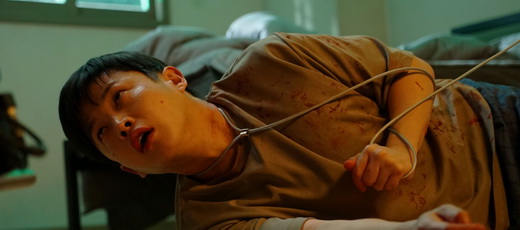 The winner of the Korean Fantastic Best Picture Award at the 2022 Bucheon Fantastic Film Festival, Body Parts is unabashedly jam-packed with a bucketful of genre conventions and, yes, clichés, but at the same time fully committed to giving the viewers, especially horror mavens, exactly what they want, in a slam-bang manner reminiscent of such recent medium-budget, high-concept South Korean chillers as Gonjiam: Haunted Asylum and Horror Stories. Of course, this being an anthology film, some of its segments are inevitably more effective than others.
The winner of the Korean Fantastic Best Picture Award at the 2022 Bucheon Fantastic Film Festival, Body Parts is unabashedly jam-packed with a bucketful of genre conventions and, yes, clichés, but at the same time fully committed to giving the viewers, especially horror mavens, exactly what they want, in a slam-bang manner reminiscent of such recent medium-budget, high-concept South Korean chillers as Gonjiam: Haunted Asylum and Horror Stories. Of course, this being an anthology film, some of its segments are inevitably more effective than others.
"The Reek" is the most predictable among the five segments: despite some good acting by the leads including the K-pop star Han Sang-hyuk, a.k.a. Hyuk from VIXX (and a shockingly disgusting makeup effect on Da-hee's character), it is marred by unimaginative visualization of the supernatural forces. "The Former Resident" has some good atmosphere to spare, with an impressive use of widescreen vistas to emphasize foreboding, dark corners of an apartment, but has little new to add to the haunted-house subgenre. "The Boy Who Can See the Ghost" is the middling entry, perhaps most enthusiastic in its deployment of scaremongering tactics and most colorful in its presentation of supernatural entities, although any decent horror film fan would be able to anticipate its "surprise" ending miles away. The wraparound segment is also efficiently realized, with some amusing nods to horror classics such as Hellraiser, even though Si-kyung's character is essentially a cipher and the big climax in which the cult leader is finally resurrected turns out to be a bit of a letdown.
The two superior segments are hands-down "Exorcism.net" and "String." The former, written and directed by G' Sam a.k.a. the TV actress Ahn Mi-na (Dr. Brain, 18 Again), in synopsis reads like a low-rent version of a Saturday Night Live sketch comedy. Surprise, surprise, it is revealed as one of the best satanic-possession-themed horror films (feature or short) I have encountered in quite some time: non-ironic, fast-paced, crisply directed and edited, the segment in twenty minutes or so manages to pack in nearly all elements we expect to see in a work of the Catholic exorcism subgenre, culminating in a doozy of a surprise ending that actually makes a strong point about untrustworthiness of parental authorities. "String," in a different vein but with an equal level of gumption, entirely does away with expository writing and character development and forges ahead with its almost abstractly surreal setup. It intelligently uses the glaring absurdity of its premise to its advantage, reaching a form of cynical, punk lyricism by its borderline Brechtian but undeniably chilling denouement.
These two episodes by themselves are certainly worth the price of admission, but even taking into consideration the weaker or more predictable segments, Body Parts demonstrates why South Korean cinema is currently a go-to place for a red-meat horror film that delivers on its promises. It is highly recommended for horror fans of any stripe, except for perhaps those for whom anything less austere and cerebral than, say, Midsommar or Sator is considered beneath their taste. (Kyu Hyun Kim)
FILM REVIEW: IN DREAM (Kyu Hyun)
Hong-hwa (Seo Hyo-rim, best known for TV dramas Scent of a Woman, Sunggyungwan Scandal and It's My Life) is a struggling artist with a secret superpower. As an unintended side effect of a sleep medication trial supervised by an ambitious researcher (K-pop group April's Yoon Chae-gyung), she is capable of infiltrating dreams of other sleeping humans. Hong-hwa has come to count this newfound ability as a blessing, given that it allowed her to keep contact, however tenuous and ephemeral, with her dying and comatose father. However, when Hong-hwa attempts to locate her missing best friend by means of accessing the latter's dreams, she finds out to her terror that the kidnapper, Jae-in (Oh Ji-ho, Man on High Heels, Sector 7), can also enter into and manipulate the dreams of others. Moreover, Jae-in, instead of regarding Hong-hwa just as another female prey, is intrigued and pleased to find another person with the same superpower and begins a subtle game of cat-and-mouse to prove that he and she are two peas in a pod— capable of using their powers for selfish, destructive ends: after all, killing a hateful client or an obnoxious neighbor in your dream would be psychologically cathartic yet perfectly harmless in real life— or is it?
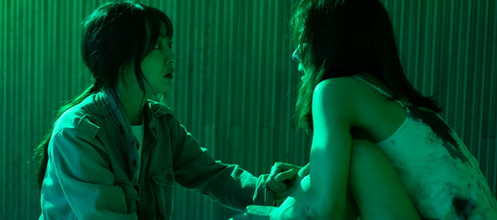 In Dream, directed by Shin Jae-ho, a seasoned screenwriter responsible for Ditto and The Clue, feels at first sight awkwardly cobbled together from the premises and plot elements found in some well-known genre films, most notably Inception and The Cell. Moreover, the serial-killer-related materials employ the type of dank, awash-in-sickly-green-light visuals and a scuzzy, malevolent suburban-abattoir aesthetic that has become overly familiar in Korean cinema at least since The Chaser, including one jarringly graphic sequence of murder that rather pointlessly reminds the viewers of not only Na Hong-jin's debut feature but also the notorious I Saw the Devil. I would not exactly call In Dream an expectation-defying tour de force: it obviously suffers from both limited production resources and the lack of originality.
In Dream, directed by Shin Jae-ho, a seasoned screenwriter responsible for Ditto and The Clue, feels at first sight awkwardly cobbled together from the premises and plot elements found in some well-known genre films, most notably Inception and The Cell. Moreover, the serial-killer-related materials employ the type of dank, awash-in-sickly-green-light visuals and a scuzzy, malevolent suburban-abattoir aesthetic that has become overly familiar in Korean cinema at least since The Chaser, including one jarringly graphic sequence of murder that rather pointlessly reminds the viewers of not only Na Hong-jin's debut feature but also the notorious I Saw the Devil. I would not exactly call In Dream an expectation-defying tour de force: it obviously suffers from both limited production resources and the lack of originality.
However, the film is not without its virtues: chief among them is its rather interesting characterization of the main villain. Instead of portraying Jae-in in a witlessly conventional manner as a grinning psychopath or an overgrown school bully (usually) with mommy issues, Shin and Oh choose to illustrate his dream-penetrating power as a form of addiction. Jae-in is neither a simplistic misogynist nor a sadist, but someone whose "guilt-" and "consequence-free" pursuit of petty vengeance and even vigilante justice has come to increasingly dominate his consciousness, and ultimately his waking life. Unlike the slick Hollywood SF film such as The Cell, wherein the monstrous villain's fractured self is merely used as a plot device, In Dream directly confronts the allure of an addiction to the kind of illusory sense of freedom generated from indulging in acts of immoral violence without having to face their real-life consequences. The academically inclined might be tempted to read in this another metaphor for our act of taking pleasure in watching violent movies featuring morally objectionable acts.
In my view, it could have been far more interesting had the filmmakers conceived Jae-in as a dangerously sympathetic figure, perhaps a "morally ambiguous" super-hero whose destructive actions and rationalizations of them provide a truly substantive challenge to the protagonist's moral compass. Even though they ultimately resort to the type of "surprise" twist-ending that most perceptive viewers could easily predict, Hong-hwa's dilemmas are addressed neither in the aggressively moralistic, sub-Twilight Zone mode (The bad guy is now stuck in his dream-hell forever! She is tearfully reunited with her father in a heavenly nursing home!), nor in a "tastefully ambiguous" "artistic" denouement that evades narrative resolution in favor of belaboring some philosophical point.
In Dream could have benefitted from either a bigger production budget or a team of conceptual artists who could have brought some color and pizzazz to visualization of the dreamscape. In addition, I have the impression that director Shin speeds things up a bit too much, as the film moves into the fourth quarter, with the exposition and plot developments coming at the viewer at a frantic rather than vigorous pace. Still, I have enjoyed the film, flaws and all, and I recommend it to fans of Korean genre cinema with some calibrated expectations. (Kyu Hyun Kim)
FILM REVIEW: WOMAN IN THE WHITE CAR (Kyu Hyun)
Set in a snowbound, semi-isolated mountain town, the film starts with two women arriving at a hospital frantically driving a white car. The more heavily injured one slips into coma, with both hands damaged by heavy blows and bleeding from a knife wound in the abdomen. The other, Do-gyung (veteran TV actor Jung Ryeo-won, also in Castway on the Moon, Pain and Gate), alarmingly disheveled and incoherent, claims that the wounded woman is her older sister. The latter had apparently visited Do-gyung, a reclusive mystery writer, to introduce her fiancé, who turned out to be a vicious misogynist and near-fatally attacked his wife-to-be. A stalwart local cop, Hyun-joo (theater actor Lee Jung-eun, best known for playing the housemaid with a secret for the wealthy Park family in Parasite), investigates but immediately smells a rat. Not only is Do-gyung's story about the wounded woman being her sister fabricated, the latter's supposed fiancé turns out to be a criminal with a long rap sheet, yet his whereabouts remain unknown. As Hyun-joo peels back layers of lies, half-truths and deliberate misdirection with dogged determination, she becomes increasingly unsure about whose narrative to trust and who is exactly responsible for what. Is Do-gyung, clinically diagnosed as a schizophrenic, telling the truth about what had transpired in her cabin? What exactly was the relationship between two women?
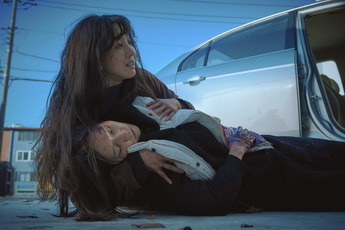 A feature film debut by Christine Hyejin Ko, a former Vancouverite who previously worked for JTBC-Netflix TV dramas such as Forecasting Weather and Love and Law School, directing a screenplay by Seo Ja-yeon (the TV drama Diary of a Prosecutor, among other works), Woman in the White Car is a robust, classically-flavored murder mystery that deftly utilizes almost every item in a bag of tricks available for this genre: an unreliable narrator (in fact several unreliable narrators), multiple flashbacks that reveal different hues of meaning each time they are replayed, hidden motivations of the characters subtly hinted in their throwaway dialogues, a sharply observant detective with a psychological trauma of her own, and carefully laid out artifacts that function as critical clues—a tire-mending equipment, a nondescript nail. In terms of tonality, the film harkens back to the Korean adaptations of the contemporary Japanese mystery novels, most notably those of Higashino Keigo.
A feature film debut by Christine Hyejin Ko, a former Vancouverite who previously worked for JTBC-Netflix TV dramas such as Forecasting Weather and Love and Law School, directing a screenplay by Seo Ja-yeon (the TV drama Diary of a Prosecutor, among other works), Woman in the White Car is a robust, classically-flavored murder mystery that deftly utilizes almost every item in a bag of tricks available for this genre: an unreliable narrator (in fact several unreliable narrators), multiple flashbacks that reveal different hues of meaning each time they are replayed, hidden motivations of the characters subtly hinted in their throwaway dialogues, a sharply observant detective with a psychological trauma of her own, and carefully laid out artifacts that function as critical clues—a tire-mending equipment, a nondescript nail. In terms of tonality, the film harkens back to the Korean adaptations of the contemporary Japanese mystery novels, most notably those of Higashino Keigo.
Although Woman's narrative is rather convoluted, director Ko and screenwriter Seo do an admirable job of keeping the viewers emotionally invested in the main characters and interested in unraveling the film's central mystery. Contributing significantly to the film's effectiveness is solid performances delivered by Jung Ryeo-won and Lee Jung-eun. Jung, who won Korean Fantastic Actor Award for her colorful turn as Do-gyung, is believably intelligent without undermining her vulnerability or mugging the camera for viewer sympathy. Lee firmly anchors the film portraying with crisp restraint a tough but compassionate detective whose gestures of understanding and empathy toward Do-gyung never come off as forced. However, the film's climactic revelations (there are several of them, piled on top of one another, thankfully never confusing) are somewhat marred by one of the chronic problems of contemporary Korean TV dramas and movies, those female characters who cannot roll out "dry" or "cool" dialogue without sounding awkward and stilted.
Overall, the film lacks flamboyance or a distinctive aesthetic appeal of a top-grade mystery thriller such as Park Chan-wook's just-released Decision to Leave, despite some striking touches such as switching aspect ratios as the film moves back and forth from a present-tense narrative to a flashback. Its pleasures stay mostly within the comfort zone demarcated by a murder-mystery genre, which might not necessarily be a bad thing for its aficionados. Still, I was pleasantly surprised by the level of emotional power the film managed to generate over its resolution, overtly melodramatic touches and a few unlikely plot developments notwithstanding. Instead of treating Woman's mystery plot as a gimmick to hook the viewers, Ko and Seo focus on the highly convincing (probably even more so in real life) combination of spiritual desperation and calculating intelligence that underlie the motivations of their female protagonists. The end product of their approach is an enjoyable brain-twister with a strong feminist (most importantly in the sense of women taking control of their lives) overtone that nonetheless does not belabor its point, likely to leave most viewers, especially female mystery fans (I think there are quite a lot of them, especially in the Asian market), emotionally satisfied as well. (Kyu Hyun Kim)